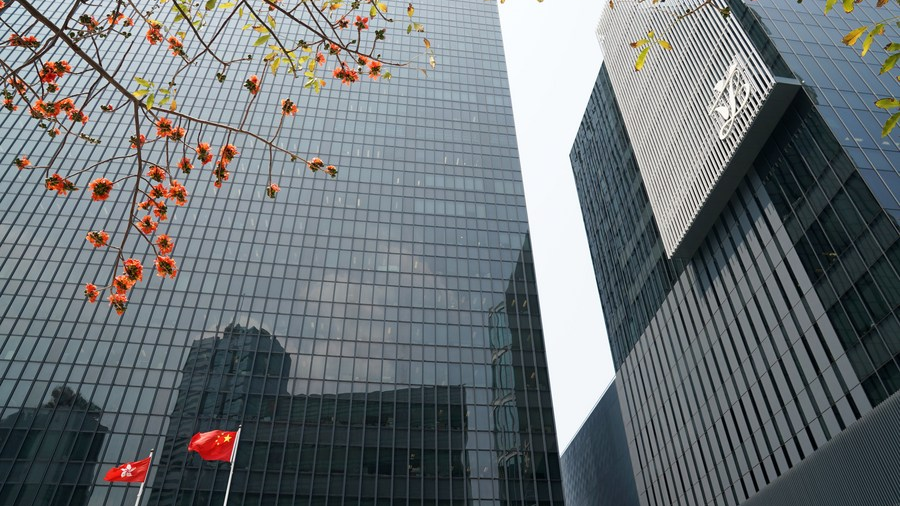
The exterior of the headquarters of the Hong Kong Special Administrative Region government and the Legislative Council in Hong Kong, south China, March 12, 2021. /Xinhua
The exterior of the headquarters of the Hong Kong Special Administrative Region government and the Legislative Council in Hong Kong, south China, March 12, 2021. /Xinhua
Editor's note: Tian Feilong is an associate professor at the School of Law, Beihang University, and a director of the Chinese Association of Hong Kong and Macau Studies. The article reflects the author's opinions and not necessarily those of CGTN.
The Hong Kong Legislative Council election has just concluded. With 90 members, a new Legislative Council that is patriotic, balanced, virtuous, and competent has formed under the new electoral system and will assume the constitutional responsibility of representative democracy given by the constitution and the Basic Law.
This is the first Legislative Council election under the new electoral system, which is a test and also manifestation of the ideal of good governance in the electoral system reform. The fundamental purpose of the new electoral system is to achieve genuine "patriots administering Hong Kong," to produce "staunch patriots" through institutional regulation and orderly competition, to select the wise and capable, to remove the shortcomings, and ultimately to promote the optimization of democracy and the rule of law in Hong Kong so that the city can be actively integrated into the overall development of China.
The new electoral system has resulted from crisis response and national legislative rationality. Protests sparked by the 2019 extradition bill amendment and the tragic experience of violence against the district councils in the same year have exposed risks and loopholes of Hong Kong's original electoral system.
First, the old electoral system lacked a clear legal definition of "patriots" and eligibility checks, which led to the infiltration of anti-China forces into the Legislative Council and distorted the standardized operation of "One Country, Two Systems." Second, the old electoral system lacked a standardized identification of and response to the intervention of external forces, which led to the manipulation and disruption of Hong Kong's electoral politics by external forces. Third, the old electoral system lacked a comprehensive jurisprudential understanding and expression of "One Country, Two Systems" and narrowly focused on just local interests and technical electoral arrangements.
Under the old electoral system, there were serious risks of populism, violence, and collusion with external forces, and there even emerged the extreme constitutional threat of a "Hong Kong version of a color revolution." In contrast, the new electoral system is the central government's response to such crises It takes the form of state protective legislation based on the jurisprudential integrity and the constitutional order of the "One Country, Two Systems" so as to guarantee "patriots governing Hong Kong" through the whole process of the electoral system.

A senior resident adds his signature in support of improving the electoral system of the Hong Kong Special Administrative Region and implementing the principle of "patriots administering Hong Kong" in Hong Kong, south China, March 7, 2021. /Xinhua
A senior resident adds his signature in support of improving the electoral system of the Hong Kong Special Administrative Region and implementing the principle of "patriots administering Hong Kong" in Hong Kong, south China, March 7, 2021. /Xinhua
Electoral democracy under the new electoral system has brought about important progress in democratic culture and competitiveness in Hong Kong in the following aspects.
First, the new electoral system has given Hong Kong elections a truly socially balanced representation structure, reflecting balanced participation in democracy in the electoral system structure composed of the electoral committee, functional constituencies, and directly elected district constituencies.
Second, the new electoral system is open, competitive, and pluralistic. People from all positions and spectrums can compete for election under the condition that they meet the statutory criteria of patriotism.
Third, the electoral competition has abandoned the previous negative electoral culture of extreme positions, inflammatory slogans, black money from external forces, information distortion by media, and threats of violence. The electoral competition has now returned to the right track of democratic rationality by focusing on competition in policy and competency. Fourth, the new electoral system has produced a Legislative Council structure that gives young people more opportunities for democratic participation and adds more vitality to Hong Kong's electoral democracy.
The fundamental purpose of all democracy is to put the people and their well-being at the center. Hong Kong society has long suffered from deep-rooted problems such as slow economic restructuring, inadequate protection of people's livelihood, and the lack of a conducive environment for youth development. Past elections and social movements were in fact nothing more than confrontation and dissension that were excessively politicized with extreme positions and even illegal violence, which seriously hindered the HKSAR government and society from facing and solving practical problems together. Being a new chapter in Hong Kong's democracy, the new election is based on the fundamental principle of "patriots governing Hong Kong," excluding anti-China forces, electing capable people to serve Hong Kong and the country, straightening out the relationship between the executive and the legislature, and enhancing the legislators' capabilities to study policy and livelihood issues and monitor the government. It also encourages all parties to work together to pursue social reconciliation, democratic unity, authority of the rule of law, and national identity.
The 14th Five-Year Plan has already rolled out. National strategies and institutions are gradually taking shape, and "One Country, Two Systems" is at a critical moment of transformation and development in the new era. Hong Kong's electoral democracy is an important part of China's democratic system, a normative development of the constitutional rationality of "One Country, Two Systems," and a positive process of democratic empowerment that demonstrates the democratic legitimacy, structural balance, competitive pluralism, and the enterprising spirit of the new electoral system. With this process effectively shaping the new democratic order and social vitality of Hong Kong, Hong Kong is bound to embrace a brighter future.
(If you want to contribute and have specific expertise, please contact us at opinions@cgtn.com.)

